Towards a Policy Roadmap1
An open government is defined by its effectiveness and efficiency in dispensing its duties. Its activities are transparent and it is a government that is responsive to its citizens’ needs. Such a government values citizen participation, experience, and knowledge when making decisions. An open government is also an inclusive government whose services are accessible by all its citizens2. These governments rely on advanced technologies to foster their governance and provision of services. In reality, there is no one definition for an open government in the related literature and references, as the meaning of this term and the concepts linked to it are not fixed, and are constantly changing. However, all of these definitions agree that improving transparency and accountability, as well as enabling citizen participation in decision making are the main goals of an open government.
Open Government depends on the two principles of openness and participation, as well as the right of each citizen to access information. This is one of the rights that is stated in the Universal Declaration of Human Rights. The first principle, openness, requires the availability and distribution of government data to the citizens and stakeholders. The second principle, participation, aims to increase the interaction and cooperation between the government and citizens in order to engage citizen input in decision making and to improve service delivery. Currently, modern technologies are considered an excellent opportunity, enabling us to support Open Government, according to the frameworks and models relied upon for open data, social media, collaborative tools, open engagement, and open innovation.
It is clear that transitioning to an open government requires a transformation in government work, and therefore requires a comprehensive, long-term program. It also requires the political will to guide this transformation, in addition to amending legislation and laws, administrative, organizational, and institutional procedures and the support of technological infrastructure on the national ground level. Open Government requires the appropriate legislative framework to reinforce its application. "Access to information law" is considered as essential aspect to the application of open government, as it establishes the right of the citizen to reach information, and provides legal cover to open and exchange government information. These also support the rights related to freedom of opinion and participation in public life, as well as reinforce democratic practices, aside from its fundamental effect on fostering accountability and transparency, as well as revealing potential corruption.
However, and despite the fact that open government requires strategic changes in the operational mode of the public sector, its economic, social, and developmental benefits, as well as the specific benefits to good governance and achieving justice, has propelled societies to adopt and transform towards this model. The application of open government leads to many direct and indirect economic benefits, and supports anti-corruption efforts. For example, we find that the application of the open data principle in Canada has led to the opening up of 3.2 billion CAD, due only to opening up data related to taxation, which has helped increase transparency and combat tax evasion3. Implementing the data policies and strategies of open government has led, on the level of the European Union, to immense economic benefits. One of the studies has revealed that the cumulative economic value for the open data market in the EU for the period of 2016 – 2020 will reach around 325 billion Euros4. Additionally, the job opportunities to be created by open data for the same period will reach 100 thousand jobs. This is in addition to the positive impact open data has on society, the environment, and culture.
Open Government and the Sustainable Development Goals
Open Government has an important impact on good governance, as it activates its essential principles represented by: accountability, transparency, inclusiveness, effectiveness, decisiveness, and responsiveness5. It also contributes to the achievement of several Sustainable Development Goals, particularly the sixteenth goal, concerning peace, justice, and strong institutions. The intersections of the SDGs with Open Government are clear in targets 16-6, 16-7, and 16-106. Additionally, Open Government is able to hasten the efforts spent to eliminate poverty (Goal 1) and improve health services and well-being (Goal 3), due to its emphasis on openness and transparency, two of its most important features. This enables citizens to monitor public spending, particularly on national development projects intended to improve the life of citizens. Beyond that, open data and collaboration contributes to an increase in the efficiency of public services, by relying and the engagement of citizens and civil society in the design stages and decision making for developmental projects in the education, clean water and clean energy sectors (Goals 4, 6, and 7). The effect of Open Government is also clear in the support of innovation and creating new job opportunities for citizens, especially among the youth (Goals 8 and 9). This is because open data provides the path for individuals, private sector, and non-governmental organizations for developing new innovative social applications fulfilling public needs and relying on open data.
Several experiments from advanced and developing countries have proven the positive impact Open Government has on social and economic development. In Education, for example, the Ministry of Education in Italy decided to open the data related to schools during a project entitled: "RomaScuola". This has enabled citizens to easily search for the best schools for their children by comparing the data, which included valuable information such as teacher absenteeism, ability to access internet at the school, and other standards important to prospective students7.
In the Health Sector, we find that experiments in the European Union have proven that citizens demand open data related to healthcare centers, as this data allows them to select the appropriate center based on geography, specializations available at each center, and the quality of service provision. From another aspect, open data has given decision-makers at the health centers the ability to review the data and information of other centers, which has generally contributed to the elevation of the service levels provided by those centers. Additionally, there are today many smart phone applications that rely on open data, and help the relevant authorities respond to emergencies more effectively. Possibly the most famous of these is PulsePoint, an application that provides the user information regarding the closest center with a defibrillator or a person trained in first aid available for cases of sudden heart attacks8.
From yet another point of view, the "Tax Free" project in Finland and the "Where Does My Money Go" in the UK allow citizens to know how the government is spending tax money, which has reinforced transparency and increased public trust in the government. Whereas in Sweden, the "Open Aid" project that the government has run is considered a success among examples of increased transparency, as this project makes available information regarding when aid is received, by whom, why it was offered, and what have been the results. This has enabled the government to improve the efficiency of fund management, saving 7 million USD annually, and reducing corruption by a value of 1.6 billion USD annually9.
Open Government Globally
The necessity for better governance, one that is able to face the challenges the world is experiencing, has led to the establishment of the Open Government Partnership (OGP) in 2011. The aim of this international partnership between various stakeholders is to help governments work towards a better governance, and increase public trust in public institutions. They would achieve this by making governments more open and responsive, and then more transparent and accountable10. By 2018, more than 70 governments worldwide have participated in the OGP, among them Jordan, Tunisia, and Morocco from the Arab region, alongside 15 local governments globally. Participating countries have committed to over 2500 obligations towards the application of Open Government principles, clearing the way for more accountability by the government.
Several advanced countries have taken important steps to become more open. Developing countries were less enthusiastic towards becoming open governments, with some exceptions such as Chile and Uruguay. In this race to openness, Northern European countries hold the top five spots for most performance indicators regarding Open Government, whereas other advanced nations hold the following 15 slots in the ranking11. In the Arab region, however, this initiative has not been adopted officially except by the three previously mentioned countries, whereas in other countries we only see some scattered open government programs or initiatives.
Table 1 shows the ranking for Open Governments of several advanced countries and a few developing and Arab countries mentioned in the World Justice Project reports for the years 2016 – 2018, and in accordance with the evaluating standards and indicators for the World Justice Project12, which relies on the following indicators: open government data, conflict resolution and disclosure of assets, transparency of budgets, inclusive policies for all. The evaluation includes six Arab states.
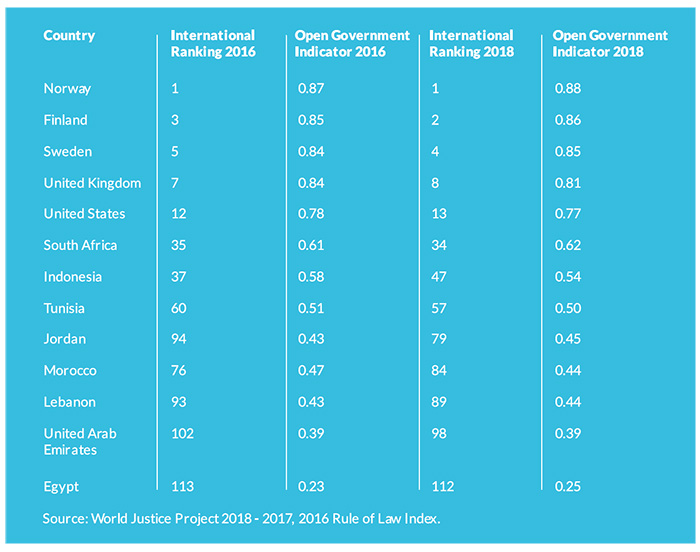
Ranking of some advanced, developing, and Arab countries in accordance with the Open Government Development indicators. Source: World Justice Project 2016, 2017 – 2018 Rule of Law Index.
Open Government in the Arab Region
With the exception of the three Arab countries that joined the OGP, and have clear and integrated plans for Open Government, the majority of Arab countries have no clear or integrated plans or strategies regarding Open Government. Some, however, have partial or comprehensive national plans that include the implementation of some dimensions of open government, while still others are in the process of setting such strategies. In reality, most of the initiatives and programs that have been approved were designed as part of standing e-government projects, and were not in fact part of any government strategy towards open government. The aim of these initiatives is either to increase the openness through the launch of open data, or to increase public engagement through expanded use of social media.
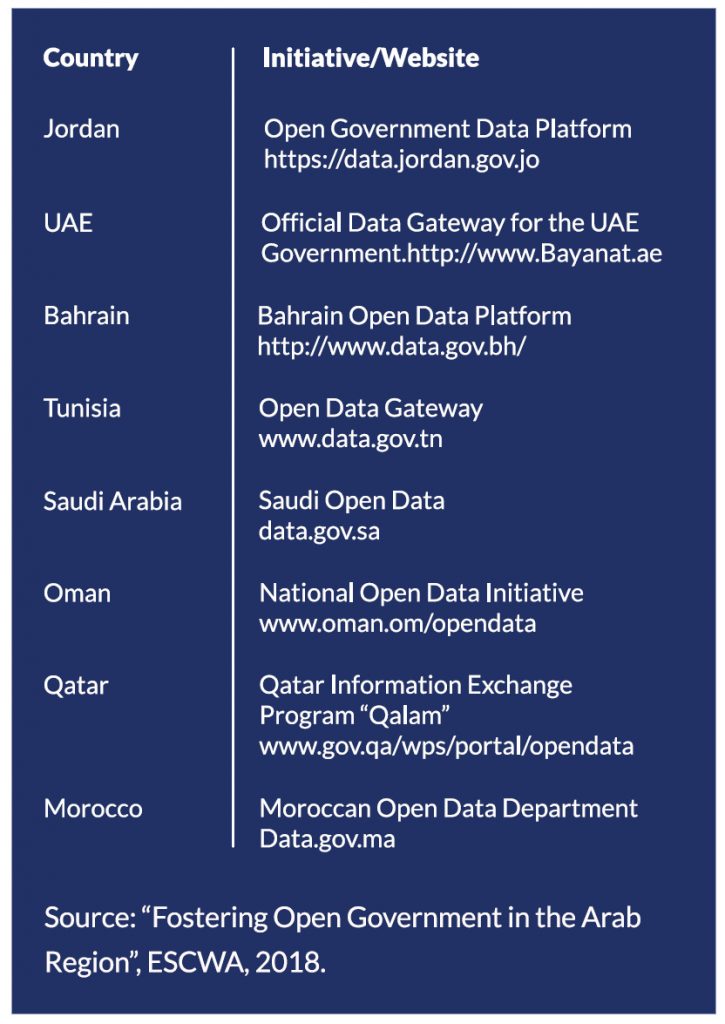
List of Open Government Data Initiatives in Several Arab Countries. Source: "Fostering Open Government in the Arab Region", ESCWA, 2018.
With regards to the legislative framework, six Arab countries have confirmed "Access to information" laws, and they are: Jordan, Tunisia, Sudan, Lebanon, Morocco, and Yemen. Tunisia has also confirmed the executive regulations for their Access to Information law, as well as created a special supervisory authority for this law. It is important to note that several Arab countries have released various legislations regarding other aspects of Open Government, such as transparency, open data, fostering integrity, and financial transparency. There are also several legislative drafts under review in a few other Arab countries13.
How Can Arab Countries Move Towards Open Government?
The application of open government in the Arab world requires a cumulative approach, passing through several key stages, represented by the following recommendations14:
Preliminary Steps:
This stage is especially important for Arab countries in order to improve their readiness for active transformation towards Open Government, as well as raising awareness about this new direction. During this stage, necessary legislative and organizational frameworks must be developed, particularly the drafting of a Access to Information law that must be confirmed and applied. From another aspect, the required technological infrastructure must also be developed, particularly in order to expand internet inclusivity and reduce the costs of access to ensure accessibility by all.
Policy and decision makers must, at this stage, prepare a "Concept Statement" that explains the meaning of Open Government, and distribute it widely. The government must also declare a "Policy Document" that drafts a national public framework for Open Government, in which it clarifies the vision and principles it will depend on in the application stage, and which will guide its decision making. At this stage, the government must also launch a continuous training program centered around Open Government and its components, particularly for those working in government, in order to maximize the use of technology in the public sector, especially open data technologies, as well as the professional use of social media platforms.
First Stage: Openness
The first stage aims to achieve openness in order to foster transparency, as it is the main entry towards implementing Open Government. The application of open data is key to this stage, and paves the way for open participation, and cooperation between the government, citizens, and all other relevant parties.
Decision makers must, at this stage, launch and implement Open Data Initiatives in order to achieve the Sustainable Development Goals and increase transparency. They must also ensure the use of appropriate and available technologies, while guaranteeing the quality of the distributed data through management and regular evaluation. They must also run awareness campaigns for the public and government workers emphasizing the importance of open data, and its developmental benefits, among them are combatting corruption.
Second Stage: Participation
This stage aims to foster the culture of participation and its practices, thereby incentivizing interaction between government departments and citizens. This stage helps both parties (government and citizens) in two ways: improving citizen participation in government work; and increasing public trust in the government.
Decision makers, at this stage, must encourage citizens to provide ideas, knowledge, comments, and suggestions to the government through technological platforms or through interactive meetings held regularly. The government must also direct public sector workers to make use of citizens’ suggestions, distribute and publicize them, and encourage them to respond to citizens through providing notes and comments. This stage relies on the expanded use of information and communication technology, particularly social media platforms.
Third Stage: Collaboration
This stage aims to foster open collaboration between government departments and citizens, as well as civil society/community organizations and the private sector. The focus of this stage is on the use of social media platforms as a collaborative tool, as well as other collaborative information tools such as specialized blogging platforms.
Decision makers at this stage must incentivize the exchange of information and data with citizens, taking their opinion seriously with regards to public policy, decisions, and legislation, while also providing services that match the needs of the end-users. They must also provide the required technological platforms in order to engage citizens in the design of services, increasing the quality and innovation of government services, which in turn will lead to lowing their cost.
Fourth Stage: Engagement
The aim of this fourth and final stage is engagement, which is a key aim of Open Government overall, drawing the participation of all stakeholders in the design of policies and the making of decisions, reaching a transparent and accountable government.
Decision makers at this stage must reinforce the previous three stages, increasing transparency by guaranteeing full access to all data and information, including financial and budgetary data, as well as increasing the freedom of expression. Participation and collaboration must be elevated to full engagement of citizens, with the aim of incentivizing citizen involvement in government work. Government departments are required to do their very best towards creating the required infrastructure and implementing effective government procedures that guarantee continuous improvement and innovation in citizen engagement programs, as well as the development of a transparent, citizen-centered government.
What is the "Open Government Partnership"?
In 2011, eight countries – Brazil, Indonesia, Mexico, Norway, Philippines, South Africa, the United Kingdom, and the United States – confirmed the declaration of Open Government, and launched the Open Government Partnership (OGP), a multi-lateral initiative, and a partnership between the government and civil society. The government, through this partnership, commits to special agreements to foster transparency, enable citizens, combat corruption, and use technology and innovation to improve governance.
To join the OGP, a nation must adopt the Open Government Declaration, and maintain certain standards, including: financial transparency, access to information, citizen participation, and statement of assets by public servants. The government must achieve 75% compliance on matters important to the OGP. The government must also present an official letter declaring its desire to join the OGP initiative, assigning a point of contact in this government for this initiative.
With the aim of supporting Arab countries in the application of Open Government, ESCWA has established a practical framework to create policies that aim to foster and apply Open Government in Arab countries. This framework is appropriate with the state of Arab countries in terms of governance, and in terms of technological investment and e-government. The framework also works in consideration of the legislative and organization conditions of government institutions. Additionally, this framework functions in accordance with the Arab community culture, and its current level of interaction with the public sector. This framework is considered a model guide for the application of Open Government and setting national plans. Among its most important features is that it is based on the best world practices, and is strongly connected to adopted e-government activity. This framework includes four main stages, represented by: Openness, Participation, Collaboration, and Participation, in addition to a few preliminary steps. It is important to note that this frame work is capable of adapting with the level and requirements of each nation, and can be expanded upon in its application across two dimensions:
Vertical: as in the application of various executive stages in sequence
Horizontal: as in the application within specific departments, then expanding to include other departments
ESCWA framework for the application of Open Government in Arab Countries15
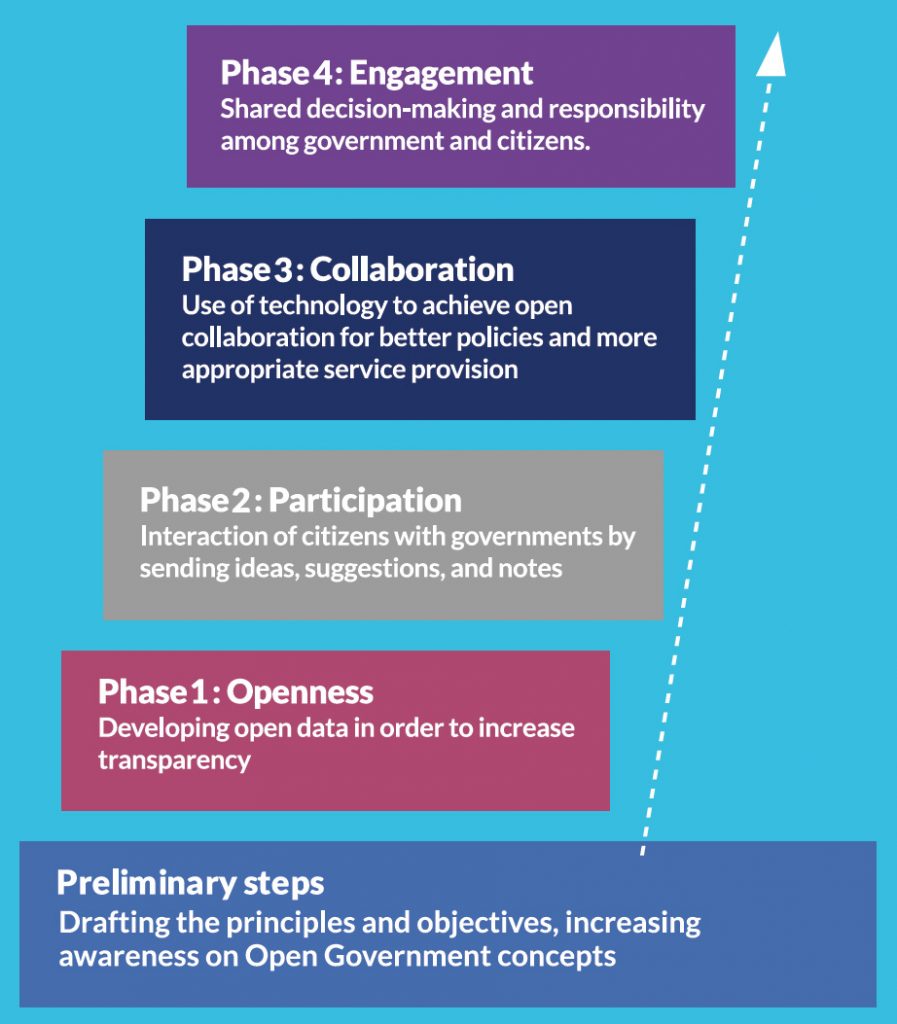
ESCWA framework for the application of Open Government in Arab Countries. Source: Source: Open Government Partnership, 2018. https://opengovpartnership.org
Towards Open Governments in the Arab Region
Transforming towards Open Government in Arab Countries is a must in order to achieve the Sustainable Development Goals. Despite a number of Arab countries applying in practice–or beginning to apply–some of the dimensions of Open Government, however a direct and comprehensive transformation towards openness and citizen engagement in decision making requires complementing efforts including a comprehensive policy or agenda to apply open Government. This policy or agenda must include legislative, legal, organizational, and technological dimensions needed to achieve transformation, in addition to capacity building. In this regard, ESCWA provides a referential framework to foster Open Government as suits the needs of Arab countries in order to transform into Open Governments, adaptable as per the needs of each individual country.
In conclusion, it is recommended that the path towards Open Government be taken gradually, by applying the steps described previously. In doing so, the focus in each stage should be on one dimension of Open Government, which are: Openness, Participation, Collaboration, and Engagement. This division into stages can help governments create changes in the legislative, organizational, and technological infrastructure, as well as human capacities, gradually and as takes into account the cultural dimension for the gradual change in the methodology of the public sector.
Nibal Idlebi is the Chief of Innovation Section at ESCWA, and a senior expert in knowledge society and technology for development. Read full bio here.
End Notes:
1 This article is prepared by Nibal Idlebi, Chief of Innovation Section, Technology for Development Division, United Nations Economic and Social Commission for Western Asia (UN ESCWA), based on the report: "Fostering Open Government in the Arab region", E/ESCWA/TDD/2018/TP.1. Available at: https://www.unescwa.org/publications/fostering-open-government-arab-region-2018
2 ESCWA definition of open government based on a literature review.
3 http://opendatahandbook.org/guide/en/why-open-data/
4 https://www.europeandataportal.eu/en/highlights/creating-value-through-open-data
5 ESCWA (2014). Arab governance report: governance challenges in countries undergoing transition. Beirut. Available at: https://www.unescwa.org/publications/arab-governance-report-2014.
6 Target 16:6 : Develop effective, accountable and transparent institutions at all levels. Target 16:7: Ensure responsive, inclusive, participatory and representative decision-making at all levels. Target 16:10: Ensure public access to information and protect fundamental freedoms, in accordance with national legislation and international agreements
7 http://blogs.worldbank.org/ic4d/open-government-data-helping-parents-find-best-school-their-kids
9 http://odimpact.org/case-openaid-in-sweden.html
10 Open Government Partnership, https://www.opengovpartnership.org
11 World Justice Project, Rule of Law Index 2017–2018
12 http://worldjusticeproject.org/
13 ESCWA (2018), Fostering Open Government in the Arab Region, chapter 3.
14 The description is based on the ESCWA Framework for Open Government
15 ESCWA (2018), Fostering Open Government in the Arab Region, chapter 4.



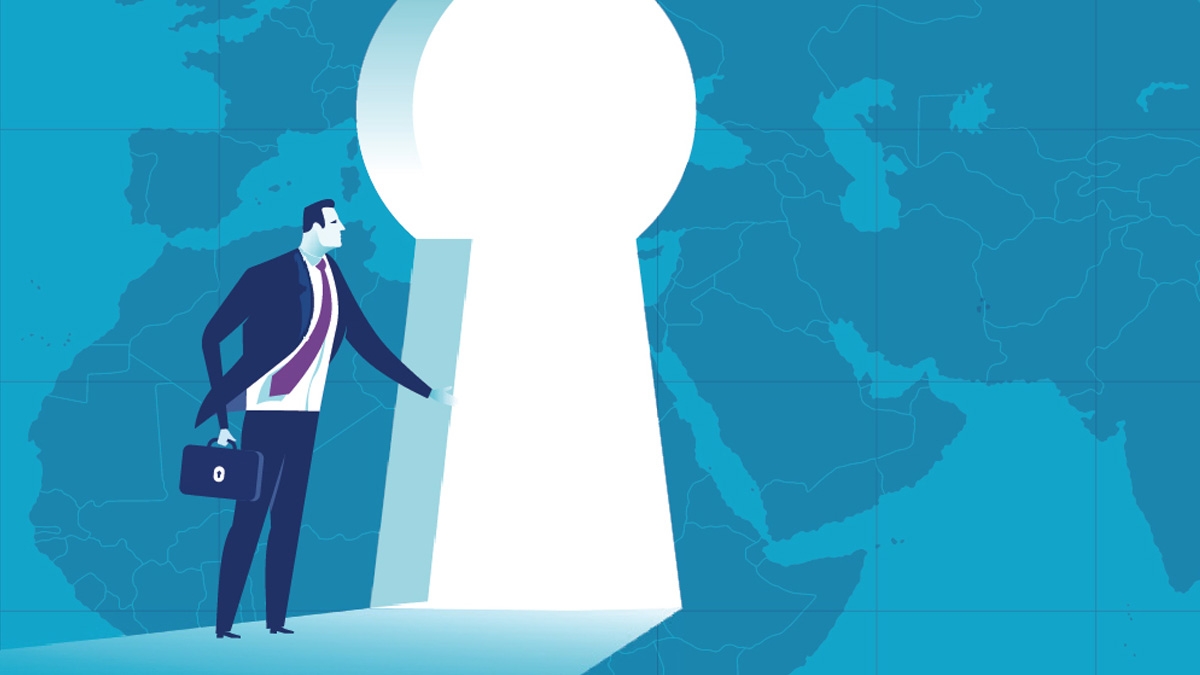
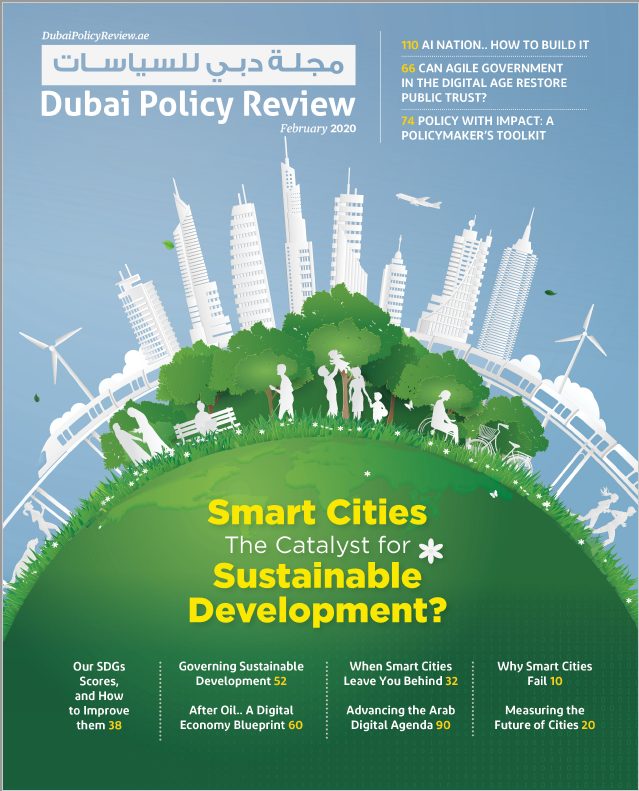


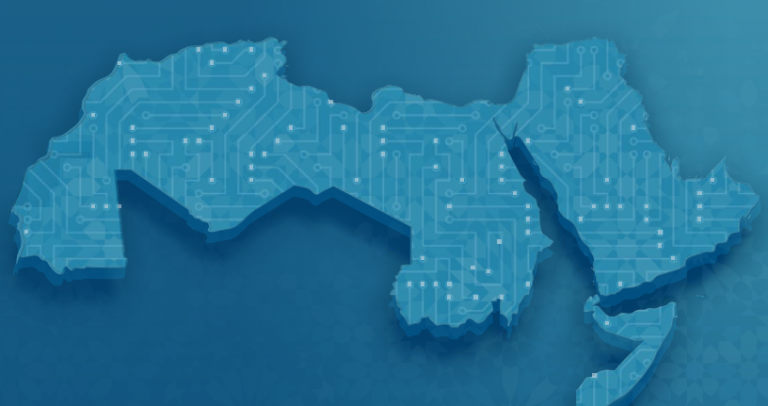







Public Policy for a Digital Future.. Introducing The Dubai Policy ReviewAugust 7, 2020 7:08 pm
[…] digital government’s contribution to sustainable development (UNDESA), creating opportunities for open government in the region (UNESCWA), triggering prospects of a new digital economy (World Bank) and enabling widely […]